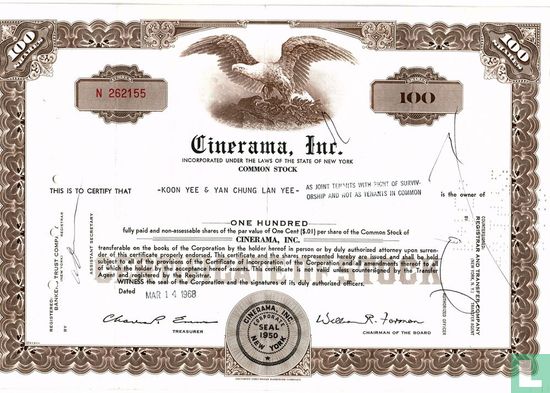Grotere foto
Cinerama, Inc., Certificate for 100 shares, Common stock
Catalogusgegevens
LastDodo nummer
1595147
Rubriek
Waardepapieren
Titel
Cinerama, Inc., Certificate for 100 shares, Common stock
Uitgevende instantie
Soort
Nominale waarde
0,01 US Dollar per aandeel
Rentepercentage (obligatie)
Branche
Land van uitgifte
Plaats van uitgifte
Jaar van uitgifte
Oplage
Decoratieve waarde
Zeldzaamheid
Afmetingen
20,5 x 30,5 cm
Bijzonderheden
Handtekeningen facsimile.
Stuk op naam.
Ontwaarding door perforatie en/of stempeling.
Variant zonder tekst "See reverse for certain definitions".
On September 30, 1952, the film “This is Cinerama” premiered at New York’s Broadway Theater as the first Cinerama film. Cinerama was the first real widescreen feature film format and was invented by Fred Waller. Engineers Hazard Reeves and Wentworth Fling carried out tests to determine the number of channels necessary to have for the format. Reeves and Waller realized that at least 5 channels would be necessary behind the screen. A 7-track head stack was created to employ the soundtrack. These seven tracks feed eight speaker channels, five behind the screen and three around the auditorium. Tracks 6 and 7 are manually switched between stereophonic surround and monophonic surround plus rear surround for selected scenes in the film. In other scenes an "umbrella" configuration was employed. The umbrella configuration sent one track to both the left and right walls and the other to a speaker in the middle of the rear wall. This was commonly used to make sounds pass over the audience.
The sound was handled by a 35mm magnetic full-coat piece of film run in interlock with three projectors for the 75-foot long, 146 degree curved screen. One of the advantages of Cinerama was the fast speed that the fullcoat piece of film. At over 29 IPS, Cinerama's fidelity was height.
At the peak of the format's popularity there were over 230 theaters around the globe showing ten performances a week. In 1961 the first Cinerama productions to tell a story were produced by Cinerama, Inc. and Metro-Goldwyn-Mayer. They were The Wonderful World of the Brothers Grimm and How the West Was Won, the latter becoming the number one box office champ of 1962.
Because of the expense and difficulties of the system, it was abandoned in 1963. Incarnations of the company continued on through the early 1970s.

